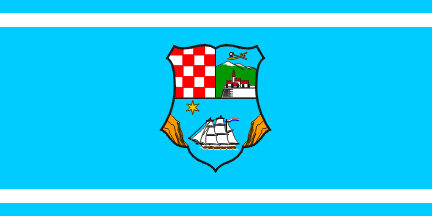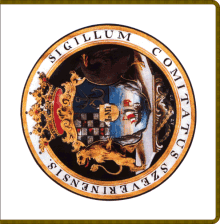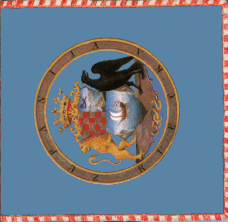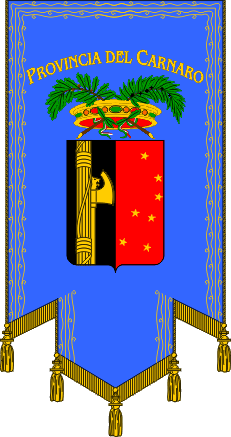
image by Željko Heimer, 22 October 2000

Last modified: 2008-07-19 by dov gutterman
Keywords: coast | gorski kotar | croatia | primorsko-goranska | zupanija | rijeka | fiume | severin | carnaro |
Links: FOTW homepage |
search |
disclaimer and copyright |
write us |
mirrors

image by Željko Heimer, 22 October 2000
See also:
Cities:
Municipalities:
Other sites:
The Coast and Gorski kotar County (or the County of Coast and
Gorski kotar, or in Croatian Primorsko-goranska županija, or
earlier Z<upanija primorsko- goranska) is a county which
consists of three geographic regions - the Croatian Coast (the
Coast under Velebit range, which since middle age always belonged
to Croatia, and was never [or rarely] claimed by others), the
Kvarner bay islands and north-eastern coast of Istria, and the
hinterland mountainous region of Gorski kotar. The seat of
administration is the city of Rijeka (known also by her Italian
name Fiume).
The County was notorious for its oppositional government in all
elections in 1990's, and had many problems in costituting the
assemby, so it is possible that the flag was adopted quite late -
my guess is 1995/96."
The coat of arms of the county is based on the coa of the former
Austro- Hungarian county of Severin, which excluded Rijeka and
the islands, but was basically in the same territoy. The county
of Severin was disassambled in 1786 and mosty added to the county
of Rijeka (again excluding the city itself). I have not found
info on the coa of that county, it seems it used the coa of
Rijeka, which is unusual, since the city used the same (as
Hungarian crownland).
Possibly at some time the coa was chnaged to something similar to
the one that is used today: divided in three - 1. Croatia; 2.
azure, a mountain range vert with snow-covered tops, in front a
fortified city, in chief crossed spike-mace argent and schmittar
or; 3. azure, between two clifs or a three-masted sailling vessel
with long tricolour pennant and a mullet or.
The flag is light blue with the coat of arms in the middle and
thin white stripes near the top and bottom (Israeli style). Ratio
1:2 (according my observation, and very probably official).
Source: photographs and drawings from D. Munic et al.
"Zupanija primorsko-goranska - the County of Coast and
Gorski kotar", Rijeka, 1996.
Željko Heimer, 28 June 1998
Concering County of Severin Coat of Arms,
Zeliko's suggestion is possible. I have bought a book: Csa'ki,
Imre: A magyar kira'lysa'g va'rmegyéinek ci'merei a
XVIII-XIX. sza'zadban, Corvina, Budapest, 1995 , in which are
shown (one big coat of arms in each page!) all the coats of arms
of the counties of the Hungarian part of the Austro-Hungarian
Empire in the XVIII. and XIX. centuries.
The coat of arms shown for the "Modrus-Fiume
va'rmegeye"-"Szeverin va'rmegyei" [Modrus (?)
-Rijeka county - Severin county] is so described: cartouche
shield divided per fess: 1- divided per pal: a- chequered of 25
gules and argent; b- azure an anchor argent with a palm leaf vert
per bend and a sword argent and or per bend sinister; 2- azure
(light) on a sea azure between two cliffs argent a little ship
brown with two sails tierced per pal gules, argent and vert and a
banner of the arms of Hungary. On the whole an inescutcheon or
with the letters I.II.M.T [for Joseph II, Maria Theresia]. The
supporters are: dexter, a lion regardant or tongued gules,
sinster an eagle regardant sable armed or tongued gules.The
shield is surmounted by a royal crown or. The whole is on a
board. The coat of arms was adopted as a seal in 1778. I cannot
understand Hungarian, but the text is also describing the coat of
arms of Fiume county.
Pascal Vagnat, 28 June 1998
Description is indeed what was Severin county Coat of Arms.
However, I am not sure if Modrus-Fiume continued to use it
unchanged...
Željko Heimer, 2 July 1998
On the web site <www.tel.hr/pgz>
it is possible to see the correct flag of the Primorsko -
Goranska zupanija (Croatian Coast and Mountains County).
Janko Ehrlich Zdvorak, 17 August 2000
we had some specualtions regarding the previous use of this
Coat of Arms, but based on info from the County site (<www.tel.hr/pgz>) one can get
the official description of the Coat of Arms and it's origin.
Based on that here it is:
The coat of arms is in shield of so called German shape, divided
per fess and upper part per pale: 1. chequy Gules and Argent; 2.
Azure, a coastal fortified City Argent with buildings roofed
Gules surrounded with Mountains Vert topped with Snow and in
chief a Sabre Or and a spiked Mace Argent in saltire; 3. Azure, a
Sail Boat proper with white sails and Croatian triband pennant at
mizzen-masthead, in chief dexter a Frankopan Star Mullet) Or all
between Cliffs proper. The coat of arms is the same as those used
by the Rijeka County between 1786 and 1886, that is in turn based
on the coat of arms of Severin County. The flag is light blue
with a thin white stripe near both horizontal edges (width of the
stripe 1/16 of flag hoist, as it is the offset from the edge). In
the middle there is the County coat of arms.
The Severin County 1778-1786 used another CoA (similar, but with
anchor in second field, and with inescutcheon). Afterwards, since
1886 to the end of Austian-Hungarian Empire, the Modrus-Fiume
County used the same Coat of Arms as Severin County. So, the
modern County decided to readopt the one used inbetween for Fiume
County (as can be seen from images on the mentioned site).
Željko Heimer, 22 October 2000
The decision on adoption of the symbols: Odluka o grbu i
zastavi Primorsko-goranske županije, 15.06.1995.
Službene novine Primorsko-goranske županije, br. 13/95,
26. lipnja 1995.
Source: [osg02]
Željko Heimer, 15 June 2003
In 1993, there were published two decision regarding the
comission to adopt the symbols:
- Odluka o osnivanju Komisije za grb i zastavu, 17.06.1993.
Službene novine Županije primorsko-goranske, br. 5/93,
20. srpnja 1993.
- Odluka o imenjovanju clanova Komisije za grb i zastavu,
17.06.1993. Službene novine Županije
primorsko-goranske, br. 5/93, 20. srpnja 1993.
The name of the members of the comission are this: Akademik Lujo
Margetic, Akademik Branko Fucic, Dr. Petar Strcic,
Nenad Labus, Daina Glavocevic, Berislav Valušek, Prof. Goran
Crnkovic, Prof. Goroslav Oštric, Kap. Branko Kundih, dipl.
iur., Dr. Rozalija Sokolic-Marušic, Prof. dr. Nikola
Matejcic.
The next is the decision adopting the symbols, already quoted by
me: Odluka o grbu i zastavi Primorsko-goranske županije,
15.06.1995. Službene novine Primorsko-goranske
županije, br. 13/95, 26. lipnja 1995.
The decision as issued contains also two black-white
illustrations, the flag and the coat of arms each in a full size
of the page (ca. 23 cm. in size).
In 1997 there are two decisions.
- Odluka o korištenju grba Županije primorsko-goranske,
28.02.1997, Službene novine Županije
primorsko-goranske, br. 4/97, 12. ožujka 1997.
- Odluka o korištenju grba Županije primorsko-goranske,
26.11.1997, Službene novine Županije
primorsko-goranske, br. 24/97, 28. studenog 1997.
The two are permitions for usage of the Coat of Arms by various
organizations, in the first case on the "Croatia
Airlines" airplane name "Rijeka" (I was flying by
it some time ago, and the Coat of Arms is indeed there, next to
the front door). The other is the permition to the county
firefighters organization to use the county Coat of Arms on their
flag.
Željko Heimer, 15 August 2003
After 1993 decisions mentioned above and the 1995 final
decision on the Coat of Arms and the flag, there was in fact an
intermediate solution adopted!
This early Coat of Arms and flag were not published anywhere yet,
as far as I am aware, and it is questionably if they were ever in
any use, however, they were official de jure until the
adoption of the current design in 1995.
Namely, the Statutes of the County adopted in 1994 include the
description of the Coat of Arms and the flag in Articles 5 though
8: Statut Županije Primorsko-goranske, 24. ožujka 1994,
SN PGŽ, br. 10/94, 31.03.1994. The description of the Coat
of Arms is virtually the same as the current one with a
distinctive difference the star in the third field is not in
chief dexter, but is set under the ship in the base, and some
further artistic differences.
In a conversation with Nenad Labus, vice-president of HGZD, who
was also member of the 1993 Commission that had task to adopt
this symbols, according to his memory, the mace and sabre were
considered to be removed from the original design (of the
Modruš-Rijeka County of 1786) as well as some members of the
Commission deemed them too aggressive for the nowadays touristic
image of the County. The reason for adding the star in a wrong
place is mysterious, though. The flag is described so (my
translation of Article 7 of said Statutes): "The Flag of the
County is light blue with the County Coat of Arms in the middle
on a white field surrounded with a dark blue ring containing
[white] inscription ŽUPANIJA PRIMORSKO-GORANSKA. The
midpoint of the Coat of Arms is in the intersection point of the
flag diagonals. The ratio of the width and length of the flag is
1:2." Now, this is quite different from what was adopted
afterwards. According to Labus, the change was made after the
refusal of the state commission to approve it - since their rules
required the two-coloured flag field (and I guess they insisted
the inscription to be removed, as well), so the solution with
white stripes of "Israeli" type was eventually adopted.
It was very close to the solution that these stripes be wavy (to
show the sea, as if it is not symbolized enough in the rest of
the elements).
The graphical solution to this symbols was made by a couple of
Rijeka artists (hopefully in due time I'll find the names) but
the artwork was not published in the official gazette, to the
best of my knowledge. Therefore, I reconstruct the design
according to the decisions..
Željko Heimer, 26 August 2007
I have received some aditional info from Robert Gribuša
from Rijeka and also paperclips from Novi List newspapers from
2004 (unknown date) showing then adopted design of the flag,
based on which I may correct my previous reconstruction.
I may add Grubiša's recount of the adoption process (based
on paperclips from the period, he has in his collection) - the
County considered retaining the red white cheques border found in
the historical flag of 1865, or adding the
yellow triple wattle.
Željko Heimer, 22 December 2007
ri.gif)
image by Željko Heimer, 22 October 2000
Flag

image by Željko Heimer, 26 August 2007
Coat of Arms
ri94.gif)
image by Željko Heimer, 26 August 2007

image by Željko Heimer, 24 March 2003
Coat of arms was granted in 1778. The County of Severin was
dissembled in 1786, most of it parts were given to the newly
formed County of Rijeka. The flag was in use together with the
flag of the County of Rijeka for a long time. Adopted: 18th
century.
Source: Jelena Borosak-Marjanovic: “Zastave kroz
stoljeca, zbirka zastava i zastavnih vrpca Hrvatskog povjesnog
muzeja”, Hrvatski povjesni muzej, Zagreb, 1996.
Željko Heimer
The flag is supposed to be sideways, i.e. it has a sleave at
the left edge of the image. With this sleave it is attached to
the flagstaff. However, design is "read" properly only
when this flagstaff is held horisontally.
Željko Heimer, 24 March 2003

image by Željko Heimer, 22 December 2007
The flag is shown in a painting from the ceremonial book of
the flag consecration ceremony on Grobnik field in 1865.
The County of Rijeka was formed in 1861, of parts of former
County of Severin and outskirts of city of Rijeka, that remained
under the rule of Hungarian crown. Flag Adopted: 25th
May 1865
Source: Jelena Borošak-Marjanovic: “Zastave kroz
stoljeca, zbirka zastava i zastavnih vrpca Hrvatskog povjesnog
muzeja”, Hrvatski povjesni muzej, Zagreb, 1996. Oštric
Goroslav: Monumenta heraldica, izbor iz heraldicke baštine
primorsko-goranske županije, Pomorski i povijesni muzej
Hrvatskog primorja Rijeke, 2002.
Željko Heimer, 22 December 2007
See also: Historical Flags of Fiume

image by Željko Heimer, 22 December 2007
1925.gif)
coat of arms
image by Željko Heimer, 22 December 2007
After the annexation of the city of Rijeka, the Italian rulers
organized the region already in 1925 into a Province Carnaro
(Croatian Kvarner). The province was granted a coat of
arms and a gonfalon by the King Victor Emanuel III in 1929. The
beautifully coloured armorial patent is preserved in the Museum
in Rijeka. The armorial is signed both by the King and Mussolini.
The coat of arms is per pale sable Roman fasces palewise or
and gules seven mullets of five or arranges as the Ursa Major.
The shield is crowned with a provincial crown with an olive and
an oak branch. The coat of arms was also main feature of the seal
granted at the same time, and undoubtedly used henceforward.
The gonfalon is a blue silk hanging banner with three fringed and
tasselled tails and bordered with golden ornament along other
three sides, containing the coat of arms in the middle and the
name of the province in an arch above. There is no evidence that
the gonfalon was actually produced and used, however beside the
coloured images of the coat of arms and the gonfalon in the
armorial patent; there are several ink drawn construction sheets
in the Museum collection. These show the flag with all the
dimensions needed for the production, however the coat of arms
included in the design is somewhat different - including also a
red chief that contains golden fasces between an oak and an olive
branch wreath tied together with a tricolour ribbon. This version
of the coat of arms must have been from a project phase. The
coloured drawings are signed by Luigi Bangori Machiavelli (?),
presumably the designer.
Flag Adopted on 28 September 1929 and abandoned on 8 September
1943.
Source: Oštric Goroslav: Monumenta heraldica, izbor iz
heraldicke baštine primorsko-goranske županije,
Pomorski i povijesni muzej Hrvatskog primorja Rijeke, 2002.
Collection of the Naval and History Museum of the Croatian
Litoral and Rijeka, thanks to Nikša Mendeš, PPMHPR,
Rijeka
Željko Heimer, 22 December 2007
It is highly probable that all of the The Coast and Gorski
Kotar County cities and communities also have a ceremonial flag,
similar in design to the one that is used by Kraljevica. If I don't report them it is
only because I have no info on them and their existance. This is
because they are produced in one example each and are not that
often seen. If they are not docummented in legislation on
otherwise in media (TV, newspapers, web) they remain virtually
"hidden".
Željko Heimer, 24 June 2003